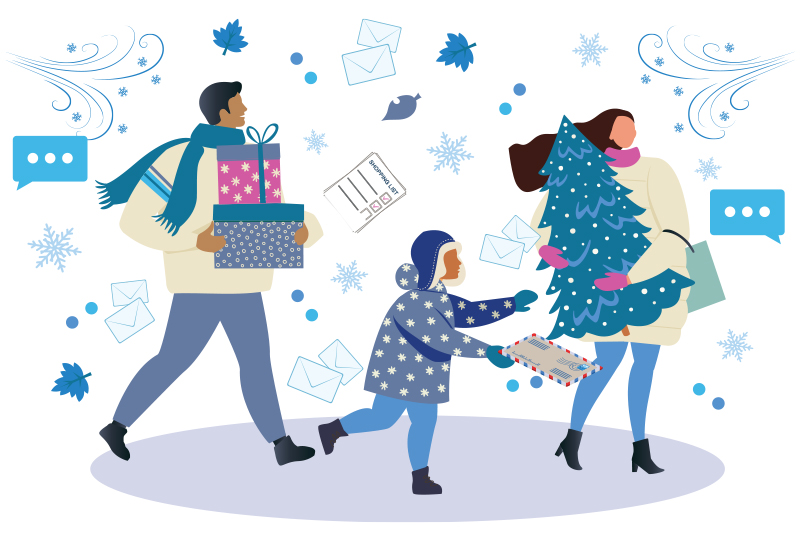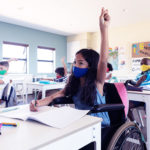Returning to holiday chaos: Preventing anxiety in kids

After taking last year “off,” many families are preparing to dive back into holiday busyness, and with it, holiday stress. But what has the time away from crowds, travel, and extended family done to kids’ abilities to enjoy the yuletide cheer?
Here, psychologist Dr. Lauren DiLullo with the Department of Psychiatry and Behavioral Sciences, answers questions about holiday stress, how it may be different this year, and what families can do to tame it.
Would you say that families and children have a lower ‘tolerance’ this year for the typical stresses of the holiday season?
It’s very likely, particularly for children who may have co-occurring medical or mental health diagnoses, such as anxiety or autism spectrum disorder.
Many kids have already felt increased anxiety this year with the return to full-time, in-person learning — the noises and number of people can be overwhelming from a sensory standpoint. Crowds and social obligations can also be a lot to manage for introverted children.
Will this year be tougher for children who became used to a ‘socially distant’ world or may have benefited from last year’s slower-paced holidays?
Just like adjusting to the pandemic was hard for many kids, there’s potential for it to be a little tricky for some children to enter or return to more of a pre-pandemic holiday lifestyle. For example, kids who are prone to difficulties with transitions may struggle this time of year. It may be helpful to plan ahead and take some proactive steps to support them. (See “Have a Plan” below).
What are some signs a child may be struggling with holiday anxiety?
Some indicators of a child being overwhelmed or unhappy are:
- increased irritability or tantrums
- increased attachment or clinginess
- homesickness if away from home
- confusion about why they are traveling or going to parties if people are still wearing masks and the pandemic is still going on
- concern about getting sick
- isolation or spending time alone during gatherings and frequently asking to go home
- reduced excitement about things they usually enjoy.
What should families do to reduce holiday angst?
To avoid overextending yourselves, which can trigger stress and anxiety, families might want to consider a few approaches:
Avoid packed schedules
Try to limit how many activities and parties you attend so that you and your child aren’t overextended or overwhelmed. Keep commitments to a one or two a week — with people your children (and you) feel comfortable around.
Stick to routines
The holidays can throw a curveball at our routines. This can trigger anxiety in children and adults alike. To minimize the impact, try to keep to sleep, meal, and exercise routines as much as possible. For example, if a holiday party goes past your child’s bedtime, try to keep to your usual schedule and bedtime the next day.
Eat mindfully
Food is a huge focus during the holidays. Between the extra sugar and calorie-rich dishes and lack of time to sit down to regular meals, it’s really easy for kids and families to fall away from proper nutrition.
Be mindful of what your family is eating. If possible, bring healthy snacks when running holiday errands and limit eating sweets to when you’re at get-togethers or parties.
Keep moving
Exercise is essential for maintaining our mood and can alleviate stress and anxiety. Try to keep to your family’s usual sports or fitness schedule, or find time to fit in some activity that elevates your heart rate.
Find quiet time and fresh air
Peace and quiet and one-on-one time with your children are especially important during the busy holiday season. Make time to read a book with your child. Work on a project together. Take a walk outside, away from noise and crowds. In fact, exposure to cold air is a great grounding technique. Grounding techniques are coping strategies to help you cope with distressing emotions or situations.
Have a plan
It’s a good idea to talk with kids in advance about what they can expect during a holiday activity: lines, crowds, family members wanting a hug. This won’t necessarily make the event less overwhelming, but it can help them prepare from a sensory standpoint. Pick a “calm down” spot for your child to go to if they are feeling overwhelmed — even if it’s the car.
Be a calm example
Be mindful of what kids have experienced over the last year and a half. Have patience — with others as well as yourself. It takes time to build back the social skills we may have lost over the last year and the tolerance to the busyness of the holidays. Kids and young adults absorb how adults react to situations, so if you allow holiday stress to get to you, your kids likely will feel it, too.
Learn more about how the Department of Psychiatry and Behavioral Sciences works with children and young adults to navigate anxiety, depression, and other mental health and behavioral health concerns.
Related Posts :
-

Taming reentry anxiety: How to prepare kids for a back-to-school like no other
After more than a year and a half of remote, hybrid, and home-schooling, it’s time to gear up for ...
-

The great mask debate: how to deal with bullying over face masks in school
As the war against COVID-19 rages on, so do the battles about the best ways to stop the spread. And, ...
-

Helping your child cope with separation anxiety
When your baby can’t seem to fall asleep in their crib after weeks of trying, or daycare drop-off always ...
-

Model enables study of age-specific responses to COVID mRNA vaccines in a dish
mRNA vaccines clearly saved lives during the COVID-19 pandemic, but several studies suggest that older people had a somewhat reduced ...





